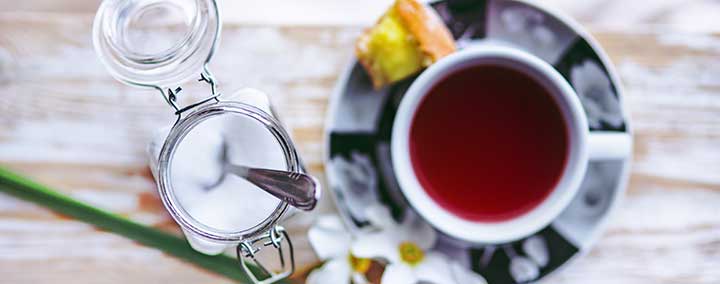When you get up in the morning and are dragging with no energy, you reach for a cup of tea or coffee. While there are health benefits to drinking tea or coffee in the morning, you don’t want to negate them with adding a couple spoons of sugar to your mug.
So what are the best sugar alternatives for tea?
Honey
Honey is a great sweetener for your tea. It’s natural, and flavors it well. However, while honey is natural, it’s not exactly low in sugars or low in calories. In fact it has the same sugars (glucose and fructose) as table sugar. And that is what most are trying to get away from. So what other sugar alternatives are available?
Agave
Agave is often viewed as a healthier alternative to sugar, and it definitely is more “natural” than refined sugar. Agave doesn’t cause a spike in blood sugar and that’s because the dominant sugar is fructose, which has been the subject of much criticism lately in leading to the same problems of insulin resistance as seen with high fructose corn syrup.
Stevia
Stevia is another sweetener that everyone has jumped on board with. The stevia sweetener comes from an herb and is “generally recognized as safe” according to the FDA. Stevia does come with some minor side effects. People have reported bloating and nausea after ingesting stevia and according to Livestrong.com people with diabetes should not consume stevia, as it can lead to hypotension or hypoglycemia. And while stevia is very sweet, it does have a bitter aftertaste similar to licorice.
Xylitol
Xylitol as a sugar alternative for tea or coffee is perfect. Xylitol has a nearly 1:1 sweetness ratio with sugar. That means you can use as much xylitol as you would normally sugar, only with 40% fewer calories and carbs. Xylitol contains no bitter aftertaste and can perfectly sweeten tea or coffee. It also has added dental benefits when consumed in appropriate amounts as it prevents dental caries. Some who use an over-recommended amount of xylitol have reported bloating and diarrhea. However, when used in the recommended amounts of 6 – 10 grams scattered throughout the day, individuals should experience little to no discomfort. The dental benefits of xylitol in reduced tooth decay are best obtained by several exposures over the day–the researchers say ‘strive for five’, which is associated with about an 80% reduction in decay. Gums and mints can help but the most economical way is just to use xylitol to sweeten your beverages and foods.
We obviously recommend xylitol as your sugar alternative for tea or coffee, but the decision of what you put in your body is ultimate yours. If you have any questions about xylitol comment and let us know, or visit our other blogs to learn more.
Related Articles
Glycemic Response
Article by Beth Hubrich, R.D., and Lyn O’Brien Nabors July 18, 2006 Read the article in it’s original location here. In an effort to clarify the physiological impact of carbohydrates, the glycemic index (GI) concept was developed and published...
Medical Journals on Xylitol
Current management of pediatric acute otitis media E Leibovitz, A Broides, D Greenberg, N Newman – Expert review of anti-infective …, 2010 E Leibovitz, A Broides, D Greenberg, N Newman – Expert review of anti-infective …, 2010 Acute otitis...
Metabolic Response to Lactitol and Xylitol in Healthy Men
The American Journal of Clinical Nutrition, 1997 April;65(4):947-50. Natah SS, Hussien KR, Tuominen JA, Koivisto VA. Helsinki University Central Hospital, Department of Medicine, Finland. View original abstract here. Abstract Sugar alcohols are...
The Benefits of Xylitol
Many people have still not heard of or used xylitol, but the benefits of xylitol are simply undeniable. What is it that makes xylitol so useful? Xylitol is an all-natural sweetener that has been studied for decades. The conclusion of studies...






Xylitol is a naturally present substance found in the fibres of many fruits and vegetables and can be made in small amounts by the body. While it can be sourced from carbohydrate molecules (called polysaccharides) in the cell walls of birch and beech trees, rice, oat, wheat and cotton husks, the main source of xylitol for commercial use is corn cobs. Once extracted and processed, you’re left with a white, crystalline powder that looks like sugar. It has the same sweetness as sugar and has become a popular sweetner in food and health products.